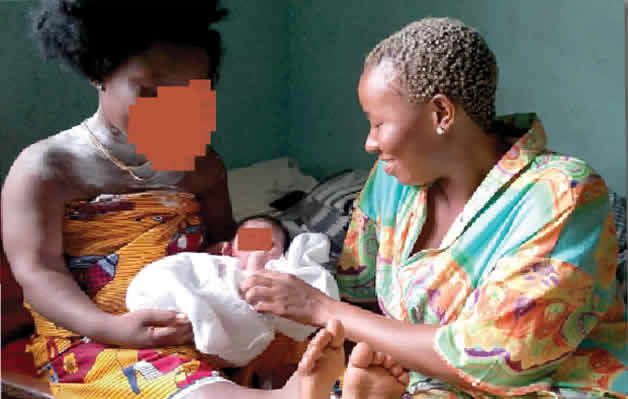Health
Why women born with male, female sex organs can father children – Gynaecologists
Published
8 months agoon
By
Ekwutos Blog
Leading obstetricians and gynaecologists have stated that individuals with female external features who were born with both male and female sexual organs (intersex) could father children.
The experts, however, clarified that this was possible in intersex females who have functional and developed male reproductive organs.
They noted that although such cases were rare, they were possible and had happened in medical history.
Their statement is coming on the heels of a recent interview with an intersex female, Queen Obukoko, who after failed relationships with men impregnated two women.
The report by Sunday PUNCH detailed how she had discovered a penile-like growth around her groin while growing up and had tried several things to ‘treat’ it.
Although Obukoko looks and has a female structure, she stated that she began to urinate through the male genitalia when she was 15 years old.
Obukoko further noted that she had trouble maintaining romantic relationships with men as they abandoned her whenever they discovered her condition.
After the failed relationships, the 30-year-old stated that she decided to have romantic relationships with women, which led to the birth of a son and daughter.
Although details of whether Obukoko knew a family member with such a condition were unclear, she hinted at the possibility of her newborn daughter being intersex.
According to the Cleveland Clinic, people who are intersex have a sexual and reproductive anatomy that does not fit into the exclusively male or female sex classification.
It added that although the intersex traits might be visible at birth, they were more pronounced during puberty and adulthood.
Also, it affirms that intersex is rare and only two per cent of people globally have the traits.
Cleveland Clinic also notes that intersex surgeries were often carried out before the child reached two years.
PUNCH Healthwise had earlier reported the confusion of parents of a 10-year-old intersex boy who after six correction surgeries, ended up with urinary incontinence and an unclear gender.
The experts, who spoke to PUNCH Healthwise, in separate interviews, explained intersex individuals could have partially functional sexual organs at birth.
The gynaecologists further noted that the dominant reproductive organ was more pronounced during puberty.
Providing clarifications on the issue, a former president of the Society of Gynaecology and Obstetrics of Nigeria, Professor Rotimi Akinola, stated that although rare, an intersex woman can impregnate another woman.
He explained that intersex individuals may possess both male and female reproductive organs that are developed and functional.
“It’s not impossible although it could be extremely rare. The reason it is not impossible is because there are some things they call mosaic. Mosaic is neither right nor left so you have both capabilities in the genital tract. It means that some cells in her body are in one line and the other in another line. The reason that you can be a hermaphrodite in the first place is the same reason why it depends on the organs and all those things.
“This is not a make-believe and it’s not the case of somebody who is trying to change sex. This is the genetic makeup and not a phenotype, like an appearance. It’s structurally so and she has both organs and they are all not rudimentary. So, to some extent, both can function,” the don said.
Akinola further stated that intersex females could have an ovary on one side and a testis on the other side.
He added that in Obukoko’s case, her physical appearance presented her as a woman but structurally, she could function as a man.
“Her appearance is such that she is better off as a woman. Yes. That’s the way she is made, that’s the way she will be accepted and that’s the way she grew up. But the fact remains that structurally she can function in another dimension,” the gynaecologist said.
Akinola, who practices at the Lagos State University Teaching Hospital, Ikeja, noted that Obukoko’s suspicion that her newborn daughter was intersex was valid as her condition was genetic and could be passed down to her children.
He further noted that undergoing intersex surgery was difficult for intersex adults because their sexual organs were fully developed, stating it was better done as a child.
“For her, it’s difficult because her sexual organs are all developed so it’s difficult to revert. She can start taking male hormones now and she’ll begin to grow a beard and then build muscles. That’s possible. But it’s going to be more difficult because of the acceptance that she has had in the past.
“But for a child, if it is confirmed, they can mask or obliterate one. In all human beings, the neutral expression of sex is female. If you don’t have androgens and testes, you will come out as a female, genetically.
“So when they talk about androgen insensitivity, that is the person is not sensitive to the male hormones and such a person will come out in the neutral gender, which is female. So the neutral gender is female for both sexes,” the gynaecologist said.
He also hinted that Obukoko could get pregnant if she had a well-developed womb.
Also, the Second Vice president of SOGON, Professor Chris Aimakhu, explained that intersex is a condition in which a human being is born with reproductive or sexual organs that cannot be characterised as male or female.
He added that it was mainly caused by abnormalities in the genetic chromosomes that are not male or female.
The don also asserted that intersex persons could have partially functional sexual organs at birth, noting that as they grow the dominant reproductive organs are more pronounced.
He further noted that most of the time, intersex persons are present in the hospital during puberty.
“Usually at puberty is when they present to the hospital when the sexual characteristics do not develop. However, surgical correction can be done to correct the organs,” Aimakhu said.
Speaking on the characteristics of an intersex, the don said, “Having ambiguous genitalia at birth, a very small penis, an enlarged clitoris, partly fused labia (labia is the inner, labia minora, and outer folds, labia majora, that forms the skin folds that protects the opening of the urethra and vagina), undescended testis that may eventually turn out to be ovaries in a male intersex and a labial or groin mass that may turn out to be testes in female intersex.”
You may like


Court Orders Suspended DCP Abba Kyari to Open Defence in Cocaine Trafficking Case


2027: PDP Governors, Senators Reject Atiku’s Coalition


I took some guys from Lagos to Abuja for Lab0ur w0rk, they are not underage ooo Atanda, these guys ran away from site and as am speaking to you I don’t know their whereabouts, their ph0ne number is not reachable Their wives and family are on my neck In fact, they have rep0rted me to the Police already and i don’t know the extent they want to drag me this matter to I don’t know when they will show up If i submit myself to the P0lice now, won’t they detain me till they show up How long will i be remanded in pris0n before coming out just because two foolish adult i gave w0rk decides to run away?


‘He wasn’t ‘Chairman’ for nothing,’ NFF mourns Christian Chukwu


Estranged Wife Of Lagos Clearing Agent Arrested For Defiling 10-Year-Old Girl Says Suspect Inflicted Injuries On Her, Abandoned Four Children Since 2016


NPFL: Adepoju backs Shooting Stars to secure continental ticket
Health
NAFDAC Begins Gradual Reopening of Shops at Ogbo-Ogwu Drug Market in Onitsha
Published
1 day agoon
April 11, 2025By
Ekwutos Blog
The National Agency for Food and Drug Administration and Control (NAFDAC) has commenced the gradual reopening of shops at the Ogbo-Ogwu drug market in Onitsha.
This development follows the agency’s closure of the market on February 10, 2025, due to concerns over the sale and distribution of counterfeit, unregistered, and substandard drugs.
The unsealing exercise is being led by a Deputy Director of NAFDAC, Mr. Tunji Omoyemi.
According to NAFDAC, traders whose shops meet the required safety and documentation standards are being cleared to resume business operations.
Addressing the traders, the market chairman, Mr. Ndubuisi Chukwulota, urged full cooperation with the agency to facilitate the swift resumption of commercial activities.



Credit: Anambra Broadcasting Service
Health
“We don’t train you and after spending all that money you leave our healthcare facilities” Gov Mbah begs nurses not to Japa
Published
2 days agoon
April 11, 2025By
Ekwutos Blog
Enugu State Governor, Peter Mbah has appealed to nursing students in the state not to leave the state after graduation to curb brain drain in the state’s health sector.
The governor made the appeal during the 2024/ 2025 Maiden Matriculation Ceremony of the Nursing College, Enugu on Thursday, April 10.
He urged the students to consider the huge resources the state was committing in training nursing and midwifery students in the state and give back to the state after graduation.
Mbah, represented by the Secretary to the State Government (SSG), Prof. Chidiebere Onyia, said “japa syndrome” was completely against the policy of the state, who had been spending reasonable amount in training them.
“We don’t train you and after spending all that money in infrastructure and the first opportunity you get you leave our healthcare facilities.
“One thing we are very particular is how we improve the service conditions so that when you go through the effort of getting your certificate, you don’t leave our state.
“That is why we are training beyond just academics so that you see that this is service and if any of you can go back to our budget in 2024 and 2025, the highest investment is in education and health,” Mbah said.
Health
2025 RETREAT FOR HEALTH DIRECTORS’: PS URGES DIRECTORS’ TO UPHOLD TENETS OF EFFECTIVE SERVICE DELIVERY & SUCCESSION PLANNING
Published
3 days agoon
April 10, 2025By
Ekwutos Blog
Directors’ in the Federal Ministry of Health & Social Welfare have been urged to ensure effective delivery of services within the Health Sector to the Nigerian populace.
This is considered very critical to achieving the mandate of the Ministry, as well as ensuring purposeful succession planning to sustain the Ministry’s current achievements.
Permanent Secretary Daju Kachollom mni, stated during the retreat for Directors’ in the Ministry held at the Carlton Swiss Hotel Enugu, Enugu State.
The theme is ” Strengthening Leadership for Effective and Efficient Health and Social Welfare Governance.
Addressing Directors, Daju Kachollom highlighted the importannce and objectives of the retreat for effective and efficient provision of healthcare services.
The retreat, she stated, will involve strategic planning to assess the Ministry’s current position, set long-term goals and, outline the steps required to achieve them.
Additionally, it will also foster team building, strengthen interpersonal relationships among participants, improve communication and, encourage a collaborative environment.
While defining Leadership as a driving force behind organisations, the Permanent Secretary implores the Directors’ to prioritise transparency, embrace innovation, foster partnerships and, build empowered, sustainable teams to ensure an efficient and effective system that meets its goals.
“In this regard, we must fully embrace the on-going reforms and take ownership of them.
We must adopt the principles of the Federal Civil Service Strategy and Implementation Plan 2021–2025, with particular focus on the new Performance Management System (PMS), which is designed to track both individual performance and our collective contributions to ministerial and national development goals.
At its core, performance management aligns individual goals with Organizational objectives, ensuring a unifieɗ direction “; the Permanent Secretary added.
Additionally, Daju Kachollom urged Directors’ present at the retreat to prioritize mentoring and succession planning.
Mentoring and succession planning, according to her, are key initiatives to strengthen and sustain the progress achieved by the Ministry.
Major highlights of the retreat include power point presentations by the participating Directors’ in the Ministry, further affirming a deliberate intent of the top management
on enhancing leadership skills and, addressing challenges facing the Ministry while offering solutions to overcome them.

Court Orders Suspended DCP Abba Kyari to Open Defence in Cocaine Trafficking Case

2027: PDP Governors, Senators Reject Atiku’s Coalition

I took some guys from Lagos to Abuja for Lab0ur w0rk, they are not underage ooo Atanda, these guys ran away from site and as am speaking to you I don’t know their whereabouts, their ph0ne number is not reachable Their wives and family are on my neck In fact, they have rep0rted me to the Police already and i don’t know the extent they want to drag me this matter to I don’t know when they will show up If i submit myself to the P0lice now, won’t they detain me till they show up How long will i be remanded in pris0n before coming out just because two foolish adult i gave w0rk decides to run away?
Trending

 Trending6 months ago
Trending6 months agoNYA demands release of ‘abducted’ Imo chairman, preaches good governance
- Business6 months ago
US court acquits Air Peace boss, slams Mayfield $4000 fine

 Politics6 months ago
Politics6 months agoMexico’s new president causes concern just weeks before the US elections
- Entertainment6 months ago
Bobrisky transferred from Immigration to FCID, spends night behind bars
- Entertainment6 months ago
Bobrisky falls ill in police custody, rushed to hospital

 Politics6 months ago
Politics6 months agoRussia bans imports of agro-products from Kazakhstan after refusal to join BRICS

 Politics6 months ago
Politics6 months agoPutin invites 20 world leaders
- Politics1 year ago
Nigerian Senate passes Bill seeking the establishment of the South East Development Commission.

